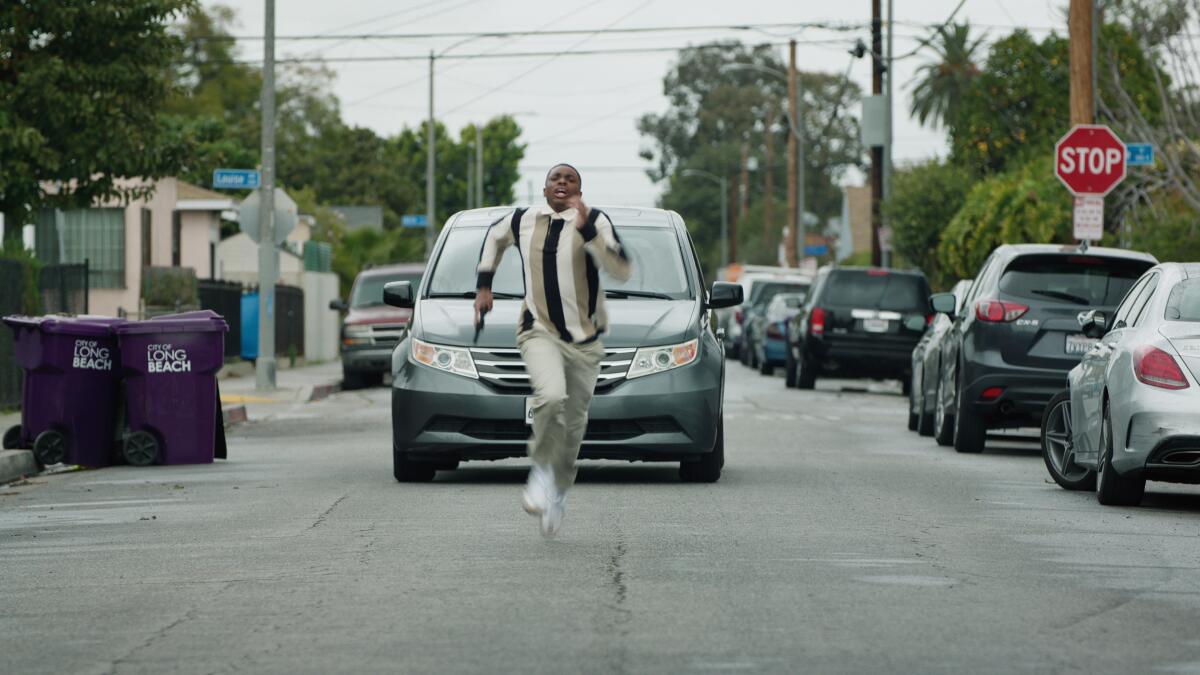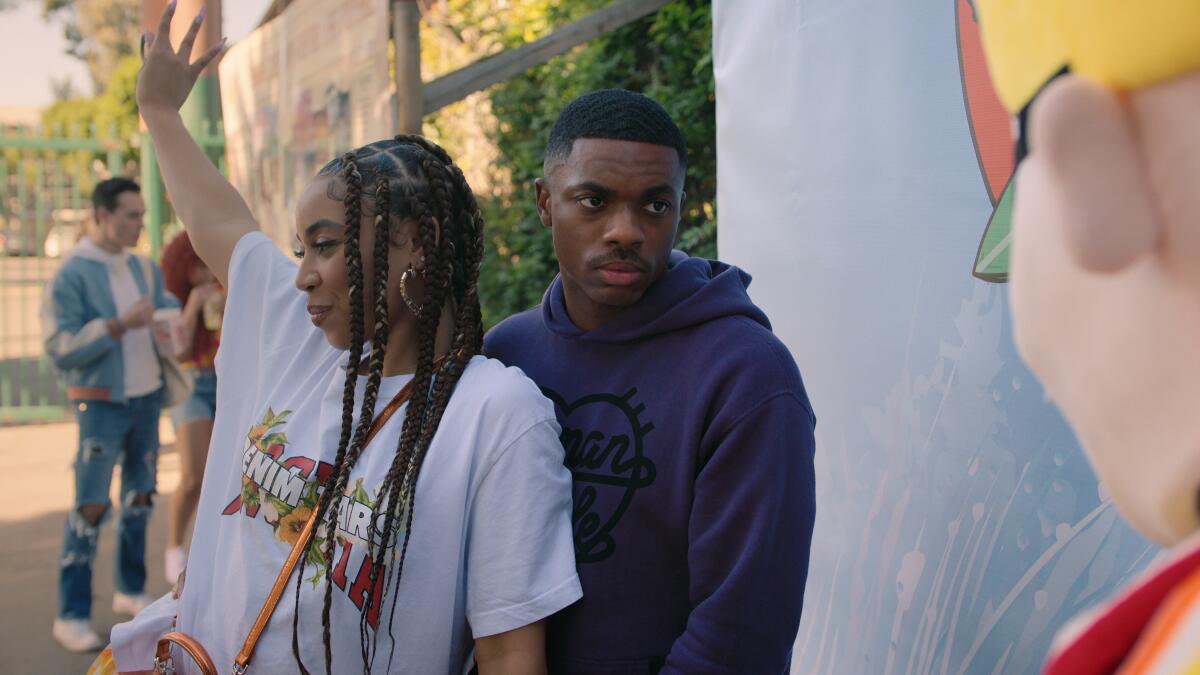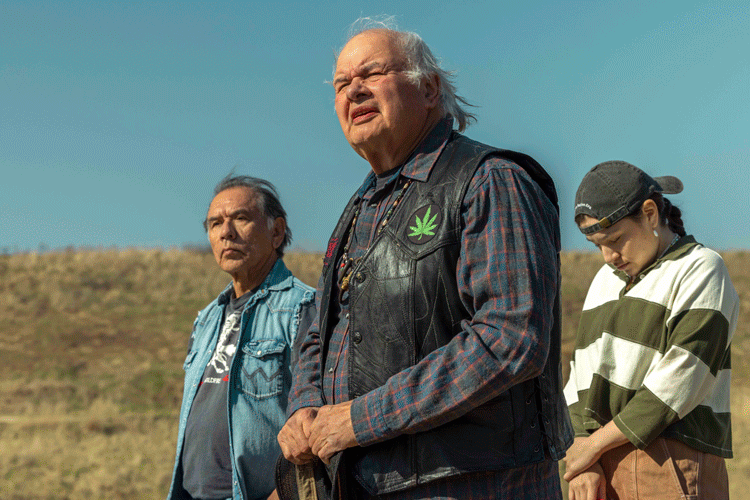Review: In ‘The Vince Staples Show,’ things go unpredictably haywire, in the best possible way

- Share via
Gap-toothed rapper and actor Vince Staples has a series, “The Vince Staples Show,” premiering Thursday on Netflix. It’s described as a limited series, which suggests that these five episodes are all there will ever be of it — which would be too bad, because it’s very good and could go all sorts of interesting, unpredictable places.
Staples, who was seen in last season’s “Abbott Elementary” as Gregory’s friend and Janine’s boyfriend, Maurice, plays a less successful, or less obviously successful, less powerful version of himself — as celebrities tend to do in such shows. (Though he carries a lot of cash and has just moved into a nice Craftsman house.) He’s a regular guy, more or less, around whom irregular life swirls and churns and slaps, a deadpan Buster Keaton. (Though there are sideways references to his abandoned gangbanging teenage past.) The police quote his lyrics back to him and ask for tickets to his shows, and a cellmate — Staples is arrested after a stop for speeding — wants to sing for him, but more often his name means nothing. “Who’s Vince Staples?” could serve as an alternate title for the show.
Vince Staples’ surrealist comedy series, now streaming on Netflix, is loosely inspired by events in his life, and what happens in any given episode is less important than how it makes you feel, he says.
Created by Staples with Ian Edelman, who created HBO’s great “How to Make It in America,” and Maurice Williams, who co-created Kid Cudi’s animated rom-com “Entergalactic,” its episodes range from 18 to 26 minutes and play as standalone short stories. Coming with color-coded titles — “Pink House,” “Black Business,” “Brown Family,” “Red Door” and “White Boy” — and set respectively in a jail cell, a bank, an amusement park, a family reunion and the course of a foot and car pursuit, they’re tied together, like Fitzgerald’s Pat Hobby stories or Updike’s Maples series, by Staples’ character. (Recurring alongside him are Andrea Ellsworth as his girlfriend, and Vanessa Bell Calloway as his mother; the performers, major and minor, are excellent throughout.)

Because this is a comedy where things go haywire, and because this is an alternative comedy, they go haywire in sometimes disturbing or violent ways, or ways that threaten to turn violent. Staples is set upon by costumed characters at a low-rent amusement park, finds himself running for his life from someone he offended in high school and in the middle of a bank robbery conducted by old friends who are happy to see him. A threadbare magic show in the “Red Door” episode seems to nod specifically to David Lynch.
“Short stories” could describe almost any episodic situation comedy, but there are shows — “Louie,” “Atlanta,” “Master of None” and “Reservation Dogs” spring to mind — that are less interested in serial development than in character and ideas and formal invention and have something in common with literary fiction. Episodes may end with nothing resolved or explained. (“How was your day?” Vince’s girlfriend asks, after an extremely strenuous one. “It was cool.” “Anything interesting happen?” “Not really.”)
For whatever reason, Black creators are behind many such shows — Donald Glover’s “Atlanta,” Boots Riley’s “I’m a Virgo,” Terence Nance’s “Random Acts of Flyness,” Henry Bonsu’s animated “Lazor Wulf” and Diallo Riddle and Bashir Salahuddin‘s sociohistorical musical sketch show “Sherman’s Showcase.” They share a taste for the surreal, the absurd, the satirical and the poetic, and Staples’ series fits comfortably, impressively among them.
Calling them “literary” doesn’t feel quite right — it’s an audiovisual experience, after all, where pictures and sounds count as much as what any character is doing or saying — but not quite wrong. “Cinematic” doesn’t fit either, but they have integrity and ambition and anyway I can’t think of a better word for this sort of television. Perhaps it’s time to invent one.
More to Read
The complete guide to home viewing
Get Screen Gab for everything about the TV shows and streaming movies everyone’s talking about.
You may occasionally receive promotional content from the Los Angeles Times.








